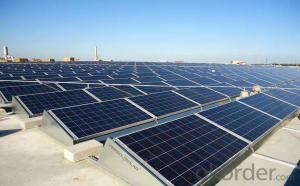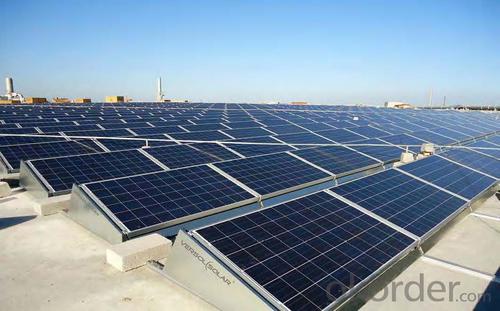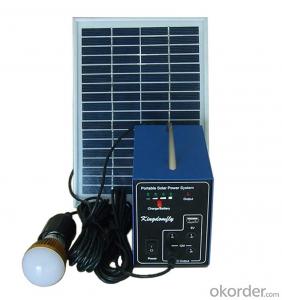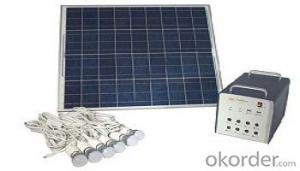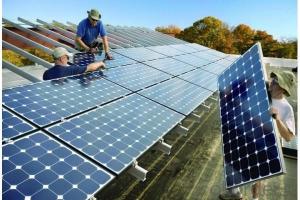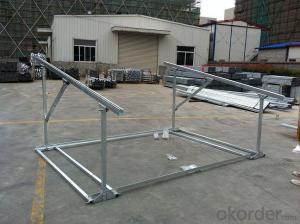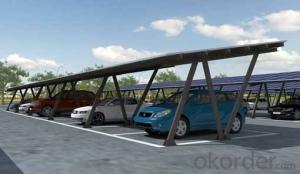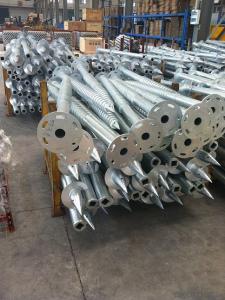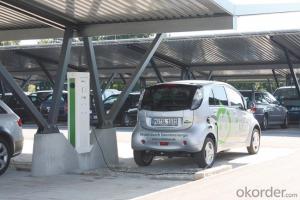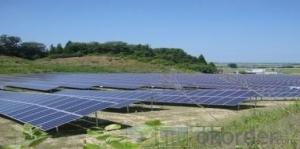Wind Water Solar Energy Systems Windstream System Solar Mounting System
- Loading Port:
- China Main Port
- Payment Terms:
- TT OR LC
- Min Order Qty:
- -
- Supply Capability:
- -
OKorder Service Pledge
Quality Product, Order Online Tracking, Timely Delivery
OKorder Financial Service
Credit Rating, Credit Services, Credit Purchasing
You Might Also Like
Project site Flat roof
Module specification All modules with frame
Installation inclination 10° -15°
Module arrangement Portrait
Module area square Client arrangement
Module area position Client arrangement
Bottom frame AL 6063T5
Supporting leg Stainless steel
Deflector Zinc plated Al-Ma board or stainless steel
Small piece Stainless steel, Al 6063T5
Bottom pieces No mechanical connection, system fixation depend on self-
weight and air flow pressure.
- Q: Can solar energy systems be used for powering research laboratories or scientific facilities?
- Solar energy systems are indeed capable of powering research laboratories or scientific facilities. The scientific community is increasingly embracing solar energy due to its numerous advantages. To begin with, solar energy systems are highly dependable and require minimal upkeep. Once installed, they can consistently and continuously supply power to research laboratories or scientific facilities, ensuring uninterrupted operations. This is particularly crucial for facilities that rely on continuous power, such as those conducting experiments or operating sensitive equipment. Moreover, solar energy is a clean and renewable power source. By utilizing solar energy systems, research laboratories and scientific facilities can significantly reduce their carbon footprint and contribute to the global fight against climate change. This aligns with the scientific community's commitment to sustainability and environmental responsibility. In addition, solar energy systems can help lower energy costs for research laboratories and scientific facilities. Although the initial investment in installing solar panels may be higher, the long-term savings on electricity bills can be substantial. This frees up resources that can be allocated to other important research activities or equipment upgrades. It is also worth noting that advancements in solar technology have enhanced its efficiency, enabling it to generate power even in areas with less sunlight. This means that research laboratories and scientific facilities located in regions with varying weather conditions can still benefit from solar energy systems. In conclusion, solar energy systems offer a viable and advantageous solution for powering research laboratories or scientific facilities. They provide reliable, clean, and cost-effective energy, aligning with the sustainability goals of the scientific community. As solar technology continues to improve, the use of solar energy in research facilities is expected to become even more widespread.
- Q: Can solar panels be used to power agricultural irrigation systems?
- Yes, solar panels can be used to power agricultural irrigation systems. Solar panels can generate electricity that can then be used to power pumps, motors, or other equipment needed for irrigation systems. This helps reduce reliance on traditional energy sources and can make irrigation more sustainable and cost-effective for farmers.
- Q: Can solar energy systems be used in developing countries?
- Yes, solar energy systems can be used in developing countries. In fact, solar energy has great potential in these regions due to its accessibility, abundance, and ability to provide clean and sustainable power. Solar energy systems can help address energy poverty, reduce reliance on fossil fuels, improve access to electricity in remote areas, and promote economic development and social empowerment in developing countries.
- Q: Can solar energy systems be used in powering scientific research vessels or marine laboratories?
- Yes, solar energy systems can be used to power scientific research vessels or marine laboratories. Solar panels can be installed on the vessels or on nearby platforms to harness sunlight and convert it into electricity, which can then be used to power various equipment and systems onboard, such as navigation devices, communication systems, lighting, and scientific instruments. This not only reduces reliance on fossil fuels but also provides a sustainable and renewable energy source for these facilities, enabling them to operate efficiently and environmentally responsibly.
- Q: How do solar batteries store excess energy?
- Solar batteries store excess energy by converting and storing it in chemical form. When the solar panels produce more energy than is needed, the excess energy is used to charge the batteries. This process involves converting the surplus electricity into chemical energy, typically through a chemical reaction. The stored energy can then be used later when the demand for electricity exceeds the amount being produced by the solar panels, such as during nighttime or cloudy days.
- Q: What is the impact of hail on the performance of solar panels?
- Hail can have a significant impact on the performance of solar panels. The impact depends on the size and velocity of the hailstones. Larger hailstones can cause physical damage, such as cracks or dents, to the surface of the solar panels, affecting their efficiency and overall performance. The damage can disrupt the electrical connections and reduce the amount of sunlight that can be converted into electricity. In severe cases, hail can even shatter the panels, rendering them completely non-functional. Therefore, it is crucial to consider protective measures, such as installing hail guards or choosing durable materials, to minimize the potential negative impact of hail on solar panels.
- Q: Can solar energy systems be used for powering electric vehicles?
- Yes, solar energy systems can be used to power electric vehicles. Solar panels can be installed on the roof or other suitable areas of the vehicle to generate electricity from sunlight. This electricity can then be used to charge the vehicle's battery, reducing the need to rely solely on electric grid power. While the amount of energy generated may vary depending on factors such as panel efficiency and sunlight availability, solar power can significantly contribute to the overall charging of electric vehicles.
- Q: Can solar energy systems be used for powering electric train systems?
- Yes, solar energy systems can be used to power electric train systems. Solar panels can be installed along the train tracks or on the rooftops of train stations to harness sunlight and convert it into electricity. This clean and renewable energy source can be utilized to charge the train's batteries or directly power the electric motors, reducing the reliance on fossil fuels and reducing carbon emissions.
- Q: Can solar energy systems be used in powering recycling plants or waste management facilities?
- Yes, solar energy systems can definitely be used to power recycling plants or waste management facilities. Solar energy systems harness the power of the sun to generate electricity, which can be used to operate various equipment and machinery in these facilities. Recycling plants and waste management facilities typically require a significant amount of energy to power their operations, including sorting and processing machines, conveyor belts, and other equipment. By installing solar panels on the roofs or in the vicinity of these facilities, they can generate clean and renewable electricity to significantly reduce their reliance on traditional energy sources. Solar energy systems offer several advantages for recycling plants and waste management facilities. Firstly, they provide a reliable and consistent source of energy, as the sun is abundant and available in most regions throughout the year. Unlike fossil fuels or other non-renewable energy sources, solar energy systems do not deplete natural resources or contribute to greenhouse gas emissions, making them environmentally friendly. This aligns with the sustainability goals of recycling plants and waste management facilities, which are focused on reducing the environmental impact of waste management processes. Additionally, solar energy systems can help these facilities save on energy costs. Once the initial investment in solar panels is made, the ongoing operational costs are relatively low. Furthermore, some regions offer incentives and financial support for the installation of solar energy systems, which can further offset the initial investment and make it more financially attractive. Furthermore, recycling plants and waste management facilities often have large surface areas available for solar panel installations, such as rooftops or open fields. This makes it easier to install a sufficient number of solar panels to meet the energy demands of these facilities. In some cases, excess energy generated by the solar panels can even be fed back into the electrical grid, allowing the facilities to earn revenue from the surplus electricity. In conclusion, solar energy systems can be effectively used in powering recycling plants or waste management facilities. They offer a sustainable and cost-effective solution, reducing reliance on traditional energy sources while helping these facilities achieve their environmental goals.
- Q: How does the color of solar panels affect energy production?
- The color of solar panels does not significantly affect energy production. The color of solar panels is mainly determined by the materials used in their construction, such as silicon or thin film. These materials have different absorption properties, but they are optimized to absorb sunlight and convert it into electricity regardless of color. However, it is worth mentioning that darker-colored solar panels may absorb slightly more heat from the sun compared to lighter-colored ones. This can lead to a slight decrease in overall efficiency as the temperature of the panels increases. To mitigate this, manufacturers often use various cooling techniques, such as placing the panels on raised mounts or incorporating cooling systems, to maintain optimal operating temperatures. Ultimately, the primary factor influencing energy production in solar panels is the amount and intensity of sunlight they receive, rather than their color. Factors like the angle of installation, geographical location, shading, and cleanliness of the panels have a much greater impact on their energy output.
Send your message to us
Wind Water Solar Energy Systems Windstream System Solar Mounting System
- Loading Port:
- China Main Port
- Payment Terms:
- TT OR LC
- Min Order Qty:
- -
- Supply Capability:
- -
OKorder Service Pledge
Quality Product, Order Online Tracking, Timely Delivery
OKorder Financial Service
Credit Rating, Credit Services, Credit Purchasing
Similar products
Hot products
Hot Searches
Related keywords
